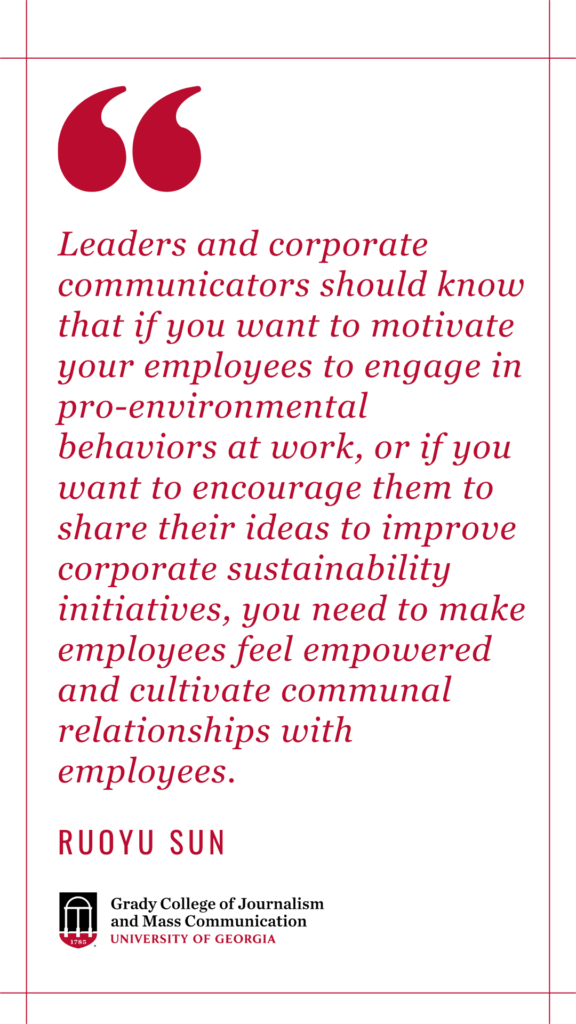Study shows the impact of environmental corporate social responsibility communication

Study shows the impact of environmental corporate social responsibility communication

With the rising threats of climate change and environmental degradation, many companies and organizations have instilled sustainability goals over recent years. But, how can they effectively motivate employees to engage in pro-environmental behaviors in the workplace?
The key is to involve employees in the conversation from the start. To maximize employee buy-in, companies and organizations should give employees a voice when developing environmental corporate social responsibility initiatives and sustainable development strategies.
That’s according to results from a recent study conducted by Ruoyu Sun, an assistant professor in the Department of Advertising and Public Relations at the University of Georgia’s Grady College of Journalism and Mass Communication, as well as Enzhu Dong from the University of Miami’s School of Communication and Yeunjae Lee from Colorado State University’s Department of Journalism and Media Communication.
“Employees’ eco-friendly behaviors at work are crucial for companies to meet their environmental sustainability commitments to society. Leaders and corporate communicators should know that if you want to motivate your employees to engage in pro-environmental behaviors at work, or if you want to encourage them to share their ideas to improve corporate sustainability initiatives, you need to make employees feel empowered and cultivate communal relationships with employees,” said Sun.
“The channels for communication, such as email, for example, aren’t as important,” Sun added. “The important part is that the employee feels that you are soliciting their thoughts and involving them in the development of environmental initiatives. Rather than telling employees what to do, employers should first have communication with employees.”
Through an online survey, the researchers collected data from 443 full-time employees across a range of companies and organizations, both big and small. The prerequisite for participating in this study was that participants must be aware of their company’s environmental sustainability initiative.
In this context, employee pro-environmental behaviors refer to environmentally friendly actions during and beyond completing work tasks, which can be, for example, conserving resources such as water and electricity when completing tasks and sharing innovative ideas to enhance corporate environmental practices.
This study was motivated, in part, by what the researchers refer to as the environmental aftermath of the COVID-19 pandemic. They point to a surge in mask and disinfectant waste, heightened plastic use and disposal, and diminished recycling efforts, among other issues, as having accelerated the need for protecting the environment and promoting sustainability.
“The COVID-19 pandemic has led to a greater awareness of the interconnectedness of human beings and nature. As researchers, we feel a responsibility to contribute to a sustainable future,” said Sun.
Strong internal communications have long been shown to bring favorable employee behaviors and help shape organizational culture. According to the authors, this study’s contribution is that it sheds light on the essential role of interacting and engaging corporate social responsibility communication in promoting employees’ pro-environmental behaviors through relationship management and self-determination theories.
The study, “Linking interacting/engaging environmental CSR communication strategy and employees’ pro-environmental behaviors (PEBs): mediating roles of communal relationship and employee empowerment,” has been published in Corporate Communications: An International Journal and funded by the Arthur W. Page Center at Donald P. Bellisario College of Communications at The Pennsylvania State University.
Author: Jackson Schroeder, Jackson.Schroeder@uga.edu